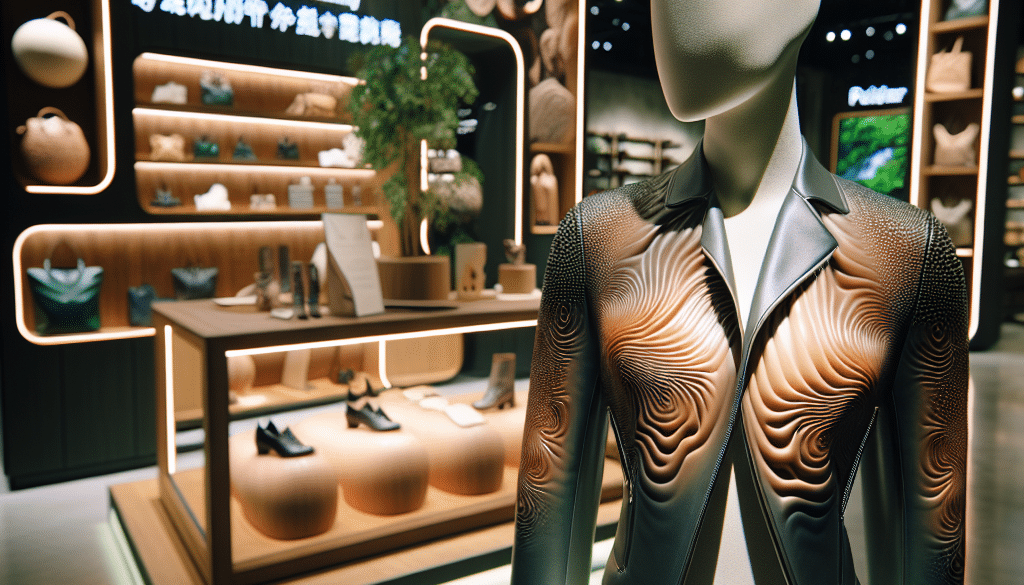Protein Leather: Eco-Friendly Fashion Future
-
Table of Contents
- Protein Leather: Pioneering Eco-Friendly Fashion’s Future
- The Environmental Impact of Traditional Leather
- What is Protein Leather?
- Case Studies and Examples of Protein Leather in Fashion
- Statistics Highlighting the Shift Towards Sustainable Fashion
- Challenges and Future Prospects
- Conclusion: Embracing Protein Leather for a Sustainable Fashion Industry
- Discover ETprotein’s Sustainable Protein Products
Protein Leather: Pioneering Eco-Friendly Fashion’s Future

The fashion industry has long been scrutinized for its environmental footprint, with traditional leather production being a significant contributor to ecological concerns. However, a new material is emerging as a sustainable alternative: protein leather. This innovative material promises to revolutionize the fashion industry by offering an eco-friendly solution that doesn’t compromise on quality or style.
The Environmental Impact of Traditional Leather
Before delving into the world of protein leather, it’s essential to understand the environmental implications of traditional leather production. The process involves:
- Extensive land use for cattle farming, leading to deforestation and loss of biodiversity.
- High water consumption for animal rearing and leather processing.
- Use of hazardous chemicals in tanning and dyeing, which can pollute waterways and soil.
- Greenhouse gas emissions from livestock, contributing to climate change.
These factors have prompted the search for sustainable alternatives, with protein leather emerging as a frontrunner.
What is Protein Leather?
Protein leather is a biofabricated material made from protein sources such as fungi, yeast, or agricultural byproducts. Unlike traditional leather, it does not involve animal hides. Instead, it utilizes biotechnology to create a material that mimics the properties of animal leather. The benefits of protein leather include:
- Reduced environmental impact, as it requires fewer resources to produce.
- No need for harmful chemicals in the production process.
- Biodegradability, which reduces waste and pollution at the end of its lifecycle.
- Animal welfare considerations, as it eliminates the need for animal hides.
Case Studies and Examples of Protein Leather in Fashion
Several companies and designers have already started incorporating protein leather into their products. For instance:
- Mylo™: Developed by Bolt Threads, Mylo is a material made from mycelium, the root structure of mushrooms. It has been used by brands like Stella McCartney and Adidas to create everything from handbags to sneakers.
- Modern Meadow: This company produces a biofabricated leather called Zoa™, which is created using yeast cells that produce collagen, a protein found in animal skin.
- Reishi™: Created by MycoWorks, Reishi is a fine mycelium leather used by luxury brands for its high-quality finish and durability.
These examples showcase the potential of protein leather to be a game-changer in the fashion industry.
Statistics Highlighting the Shift Towards Sustainable Fashion
The demand for sustainable fashion is growing, with consumers becoming more environmentally conscious. Statistics show that:
- More than 60% of consumers are interested in purchasing sustainable or ethical fashion.
- The global ethical fashion market is expected to reach $8.25 billion by 2023.
- Sustainable product launches have increased by 40% in recent years.
These figures indicate a significant shift in consumer behavior and market trends, favoring sustainable materials like protein leather.
Challenges and Future Prospects
While protein leather offers many advantages, there are challenges to overcome, such as:
- Scaling up production to meet global demand.
- Ensuring the material’s performance matches or exceeds that of traditional leather.
- Overcoming consumer skepticism about non-traditional materials.
Despite these challenges, the future of protein leather looks promising. Continued research and development are likely to enhance its properties and reduce costs, making it a viable alternative for mass-market adoption.
Conclusion: Embracing Protein Leather for a Sustainable Fashion Industry
Protein leather represents a significant step forward in creating a sustainable fashion industry. With its reduced environmental impact, potential for biodegradability, and ethical considerations, it offers a compelling alternative to traditional leather. As technology advances and consumer demand for eco-friendly products grows, protein leather is poised to become a staple in the fashion world, leading the charge towards a more sustainable future.
Discover ETprotein’s Sustainable Protein Products
In line with the sustainable ethos of protein leather, ETprotein offers a range of plant-based protein products that align with eco-friendly practices. Their organic and non-GMO protein powders, including rice, pea, and seed-based proteins, cater to various industries while upholding environmental responsibility. By choosing ETprotein’s products, businesses can contribute to a greener future and meet the rising demand for sustainable options.
About ETprotein:
ETprotein, a reputable plant protein vegan protein Chinese factory manufacturer and supplier, is renowned for producing, stocking, exporting, and delivering the highest quality organic bulk vegan protein and plant proteins. They include Organic rice protein, clear rice protein, pea protein, clear pea protein, watermelon seed protein, pumpkin seed protein, sunflower seed protein, mung bean protein, peanut protein etc. Their offerings, characterized by a neutral taste, non-GMO, allergen-free attributes, cater to a diverse range of industries. They serve nutraceutical, pharmaceutical, cosmeceutical, veterinary, as well as food and beverage finished product distributors, traders, and manufacturers across Europe, USA, Canada, Australia, Thailand, Japan, Korea, Brazil, and Chile, among others.
ETprotein specialization includes exporting and delivering tailor-made protein powder and finished nutritional supplements. Their extensive product range covers sectors like Food and Beverage, Sports Nutrition, Weight Management, Dietary Supplements, Health and Wellness Products, and Infant Formula, ensuring comprehensive solutions to meet all your protein needs.
As a trusted company by leading global food and beverage brands and Fortune 500 companies, ETprotein reinforces China’s reputation in the global arena. For more information or to sample their products, please contact them and email sales(at)ETprotein.com today.












